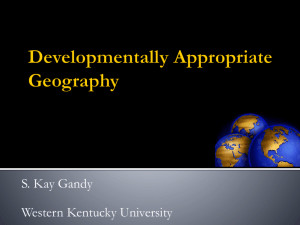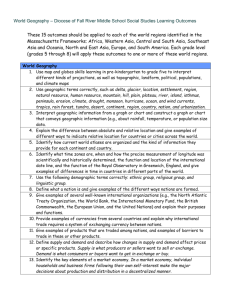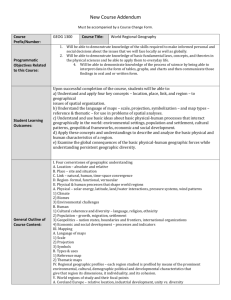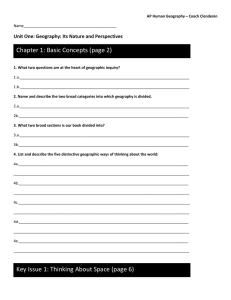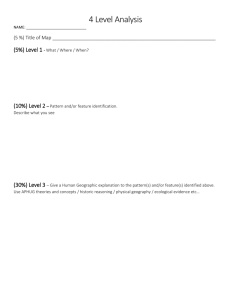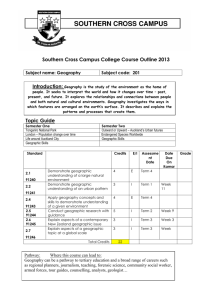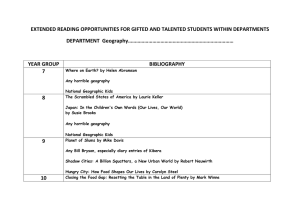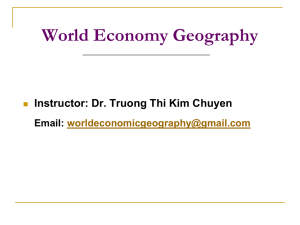Colorado Geographic Alliance
advertisement
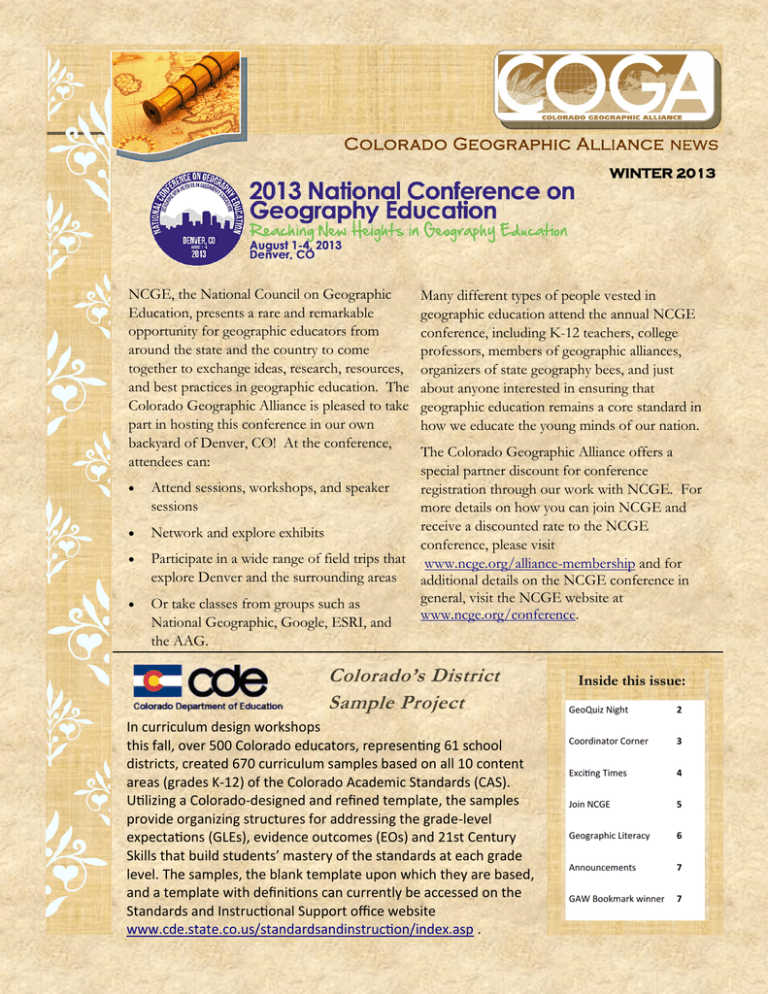
Colorado Geographic Alliance NEWS WINTER 2013 NCGE, the National Council on Geographic Education, presents a rare and remarkable opportunity for geographic educators from around the state and the country to come together to exchange ideas, research, resources, and best practices in geographic education. The Colorado Geographic Alliance is pleased to take part in hosting this conference in our own backyard of Denver, CO! At the conference, attendees can: Many different types of people vested in geographic education attend the annual NCGE conference, including K-12 teachers, college professors, members of geographic alliances, organizers of state geography bees, and just about anyone interested in ensuring that geographic education remains a core standard in how we educate the young minds of our nation. The Colorado Geographic Alliance offers a special partner discount for conference Attend sessions, workshops, and speaker registration through our work with NCGE. For sessions more details on how you can join NCGE and receive a discounted rate to the NCGE Network and explore exhibits conference, please visit Participate in a wide range of field trips that www.ncge.org/alliance-membership and for explore Denver and the surrounding areas additional details on the NCGE conference in general, visit the NCGE website at Or take classes from groups such as www.ncge.org/conference. National Geographic, Google, ESRI, and the AAG. Colorado’s District Sample Project In curriculum design workshops this fall, over 500 Colorado educators, representing 61 school districts, created 670 curriculum samples based on all 10 content areas (grades K-12) of the Colorado Academic Standards (CAS). Utilizing a Colorado-designed and refined template, the samples provide organizing structures for addressing the grade-level expectations (GLEs), evidence outcomes (EOs) and 21st Century Skills that build students’ mastery of the standards at each grade level. The samples, the blank template upon which they are based, and a template with definitions can currently be accessed on the Standards and Instructional Support office website www.cde.state.co.us/standardsandinstruction/index.asp . Inside this issue: GeoQuiz Night 2 Coordinator Corner 3 Exciting Times 4 Join NCGE 5 Geographic Literacy 6 Announcements 7 GAW Bookmark winner 7 COLORADO GEOGRAPHIC ALLIANCE NEWS GeoQuiz Night for Geography Awareness Week As part of the Geography Awareness Week Celebration, the UCCS GeoClub hosted GeoQuiz night at Clyde’s on the UCCS campus. This night featured Jeopardy-style trivia for students of all ages—from pre-K through college. Some of the younger students were able to answer questions that even the professors on site balked at. Thanks to the UCCS GeoClub for their hard work putting on this phenomenal event. Page 2 WINTER 2013 Page 3 COGA Coordinator Corner - Steve Jennings, COGA Coordinator Greetings from COGA. We have had a great year in 2012 and are looking forward to the growth of COGA in 2013. For several years COGA has been working toward developing a strategic plan that will guide the organization well into the future. This planning process was mandated by the National Geographic Society and has been one of the best things that could have happened to COGA. We are focusing the efforts of COGA with the goal of making the organization sustainable. On January 12 of this year the Leadership Council met and in an all-day meeting identified the three initiatives from the strategic plan that COGA will concentrate on this year. First, Rebecca Theobald will start collecting data about all of the school districts in Colorado to determine the state of geography education in each district. Second, the Leadership Council decided to work on networking and gaining COGA more visibility. Third, a committee was formed to develop a website that has pertinent educator resources. Given these initiatives we are welcoming your contributions. Do you know of a school district that needs support with geography education? Is there an organization that you think would make a great partner with COGA? What is your favorite standards-based classroom resource? Let us know. The more information we have the better. We are dedicated to expanding and improving COGA and need all of you as partners in our efforts. Be sure to mark your calendar for the Annual Meeting of the National Council for Geographic Education (NCGE) in Denver. Pre-conference field trips are July 30th and 31st, and the conference runs August 1st through August 4th. This is a great opportunity and it will probably be a long time before NCGE comes back to Colorado. We are looking for folks to help out with field trips, hospitality, and general meeting support. Let’s show folks from around the country how great a place Colorado is. Submit your best ideas to be presented at the NCGE Conference Image courtesy of Chicago District 299 Remember how excited your students were when you introduced them to topographic maps? or the first time they understood push and pull factors related to migration? or when they created their own maps using on-line tools? If you have a lesson or experience you would like to share, the NCGE conference is the place to do that. For information about proposal submission see http:// www.ncge.org/call-for-proposals. This nationally-recognized conference showcases the best in geography education each year. If you are a teacher who would like to share a great lesson with others, or you offer a different approach to geography through science or environmental analysis, consider preparing a proposal and submitting it to NCGE by March 31st. If you are a member of NCGE and COGA (http://www.uccs.edu/Documents/coga/ COGA_Flyer_MembershipFlyer.pdf), and you submit a proposal to present at the conference, COGA will pay $70 of your registration fee. See the registration rates at http://www.ncge.org/registration-rates. COLORADO GEOGRAPHIC ALLIANCE NEWS Page 4 Exciting times to be a geographer! - David Lambert, National Geographic Cartographer and COGA Leadership Council Member Perhaps you have heard the saying “everyone likes progress, but no one likes change”. Whether on the physical landscape or in technology, change is the one constant, and challenge, a professional cartographer knows best. My cartography career with National Geographic began in the mid-1990s. It was a time of transition for many cartographers, as some maps were still being drawn using photomechanical and drafting techniques, such as scribecoat film negatives. Significant advances were continually being made, however, in the world of computer cartography. By the turn of the century, terms such as GIS (geographic information system) and GPS (global positioning system) would nearly become household names by professionals and nongeographers alike. It doesn’t take much today to realize maps are more easily available than ever before. From GPS units in the dashboard of your car to the smart phone in your hand, maps seem to be everywhere. In Historic National Geographic Map of Colorado, circa 1933. Photo courtesy of National addition, map users now expect quality and accuracy at all times. Geographic. These are exciting times for cartography, and it is just as exciting to see how far we have come. Next time you are lost on a hiking trail or driving in the Denver metropolitan area, remember there is a cartographer out there trying to make it better for everyone. Citizen Science: Project BudBurst Spring is just around the corner—within the next few months, plants all over the country will begin blooming. Project BudBurst is a network of people around the country who monitor plants as the seasons change and submit data based on timing of leafing, flowering, and fruiting plants. The BudBurst.org website includes activities to use in the classroom at all grade levels. This site and more are included on the COGA website at uccs.edu/COGA. New updates added all the time—check it out! Page 5 WINTER 2013 Join the National Council for Geographic Education: Expertise, Enthusiasm, Tenacity, Curiosity, and Network --Joseph Kerski, Ph.D. Geographer, Education Manager, Esri. jkerski@esri.com Do you love geography? Believe that students need to have frequent and rich experiences with geography education from primary to university level and beyond? Believe that because it deals with key issues of the 21st Century, that it is fundamental to our future as a society? Then join with others who believe this as you do by becoming a part of the National Council for Geographic Education (NCGE) (http://www.ncge.org). As I reflect upon the nearly 20 years I have been a part of this organization, five words come to mind. The first is expertise. Geography educators know their content and their discipline. Whether their specialty is soils, population, GIS, or something else, they understand the fundamental themes and tenets of geographic content, skills, and perspective. The second word is enthusiasm. It is rare to meet a geography educator who is not passionate about the subject. The third word is tenacity. I admire the work each of you is doing. Education is not for the faint-hearted. You are making a difference not only in students' lives, but throughout the educational community. We must be tenacious to move geography education into a position where it is funded, supported, respected, taught, and used throughout education and society. Nobody is going to do it if we don’t. The fourth word is curiosity. We are curious about all things geographic, from local issues about how our community demographics change over time, how growth in Colorado impacts land use and water availability, why earthquakes happen around Trinidad, to global issues such as energy, sustainability, and climate. That curiosity motivates us to learn, to practice what we have learned, and to teach it to others. The fifth word is network. Through NCGE, you can be more effective in your profession through networking with others. We build partnerships with the social studies, environmental education, and science communities, among others. They can lead to joint curricular and research projects and professional development, such as when the NCGE was involved with the NSF and National Geographic on a project to define Geographic Literacy. When I was NCGE President in 2011, I stated this vision for NCGE: NCGE nurtures and supports excellence in teaching and learning geography in all levels and venues of education. In so doing, it encourages and values members and others in the geography education community personally and professionally, provides professional and curriculum development through webinars and face-to-face means, conducts research, and produces scholarship about that research. It partners with other organizations to make a positive impact on teaching, learning, educational research, and educational policy. Its goal is to instill in every person a sound understanding of geographic content, develop geographic skills, and enable a geographic perspective that will enable wise decision making in society. One excellent way to connect with the NCGE community is to attend this year’s annual conference on geography education in Denver. The Colorado Geographic Alliance was instrumental in bringing the conference to Colorado this year for the first time. You can participate in field trips, give a presentation or poster or see others, participate in hands-on workshops, view exhibits, and much more. See my 30 second video highlights to pique your interest: http:// www.youtube.com/watch?v=Tcoq1SIrfd8. I hope to see you there! COLORADO GEOGRAPHIC ALLIANCE NEWS Page 5 Are your kids geographically literate. . . Enough? - Cyndy Hines, Parent and COGA Leadership Council Member The Colorado Academic Standards (CAS) have been rewritten, and 2014 testing will soon reflect the proposed instructional shifts in teaching and curriculum. According to its website, CDE is moving away from checklists and benchmarks as the primary metrics for student achievement toward an integrative cross-disciplinary approach to teaching and assessment. Educators are now proposing coursework that not only provides K-12 children with inter-disciplinary concepts and skills, but emphasizes mastery of content and the ability to apply and transfer that knowledge across pedagogies as well. The call for cross-disciplinary education has put K-12 social sciences in the spotlight; the integration of spatial awareness is key to the proposed changes in academic standards. In fact, nearly 28% of the 2014 state social studies test will cover geographic concepts and topics. However, geography is not currently taught as core coursework. How will our students be prepared for the upcoming 2014 changes in academic assessment? Moving geography to the forefront of core curriculum is one way to achieve the state’s new goals and standards. Geography encompasses the study of earth’s physical attributes and inhabitants across space and time. It provides the conceptual and theoretical frameworks Photo by Brent Danley necessary to raise our spatial consciousness, a must if we are to better understand the delicate balance between human activity and ecosystem function and health. CDE supports the development of broader spatialtemporal perspectives in an effort to deepen the student’s appreciation of and personal connection to the world, both of which play a critical role in postsecondary education and work force readiness. Visit the Colorado Department of Education website to learn more. Then visit your child’s teacher and principal. Get involved. Let Colorado educators know you support geography as a core curriculum. Help change the way we understand and experience the world. Volunteers Needed At NCGE Photo courtesy of University of Alaska Fairbanks. Are you interested in attending the Denver NCGE conference, but are not sure the registration fee is in your budget this year? If you are a member of the Colorado Geographic Alliance and the National Council for Geographic Education (available for $50 – check out the online form at http:// www.uccs.edu/Documents/coga/COGA_Flyer_MembershipFlyer.pdf), you are eligible to apply to be a volunteer at the NCGE conference. Volunteers are needed to help with registration, field trip support, A/V set-up, session monitoring, book signings, exhibits, and clean-up. Your registration will be complimentary if you volunteer at least 15 hours. If you are interested in taking advantage of this opportunity, please contact Jackie Waite at NCGE (jwaite@ncge.org). Specific days and times will be assigned as the conference gets closer. WINTER 2013 Page 7 Mark your calendar! The 5th Annual GIS in Higher Education Summit – Colorado will be held on Friday, March 22, 2013 at the University of Colorado, Colorado Springs. For more information contact: Dr. Paddington Hodza Director, Certificate in GIScience Department of Geography and Environmental Studies University of Colorado Colorado Springs Email: phodza@uccs.edu Congratulations to our friends at esri! The Denver Post has named the company Colorado’s top “Thinkers in Technology” for 2012. They are noted for their excellent work with online mapping of wildfires throughout the country, providing real time effects, social media integration, and photography. Way to go esri! Geography Awareness Week Bookmark Contest Winner! Congratulations to Kathy Vo, a 6th grader from Grant Beacon Middle School in Denver, CO. She was selected as the winner of the 2012 Geography Awareness Week Bookmark Contest. For her hard work she will receive: A $25 gift card A Map from National Geographic And an inflatable globe. Kathy’s teacher, Ms. Cocos, will receive a 1-year subscription to National Geographic for her classroom. In addition, Kathy’s bookmark will be printed and distributed to schools in Colorado for 2013 GAW. Colorado Geographic Alliance Department of Geography and Environmental Studies 1420 Austin Bluffs Parkway Colorado Springs, CO 80918 We connect educators, administrators, non-profits, geographic corporations, and legislators with each other, forming a community of stakeholders in Geographic Education. Phone: 719-255-5217 E-mail: coga@uccs.edu Web: www.uccs.edu/~coga Facebook: www.facebook.com/ coloradogeographicalliance COGA coordinates and sponsors teacher education workshops throughout the year to advance understanding of geographic education. Giant Traveling Maps are available through a partnership with the National Geographic Society to bring a new understanding to your students of their connection to the world. COGA sponsors a yearly Geography Awareness Week full of activities to advance public understanding of the important of geography. The Colorado Geographic Alliance endeavors to instill and nurture spatial awareness and geographic literacy, by changing how you understand and experience the world. COGA is now on Facebook! COGA has taken steps to join the rest of the world in the 21st century and joined Facebook! You can find us at www.facebook.com/ coloradogeographicalliance. The COGA Facebook page is the place to get connected with frequent updates on what’s happening nationwide in the world of geographic education, along with upcoming workshops and events of interest to Geography educators throughout the state. School Speed Test—Please take part! Is your school's Internet access fast enough for digital learning? Join thousands of colleagues across the nation to find out by taking the school speed test. In less than a minute you'll know the speed of your school's Internet access and the types of digital learning it can support. We are passionate about the potential for digital learning to transform education — but the reality is we must first upgrade the Internet infrastructure in our schools. By testing the Internet access in our schools during the National School Speed Test we will know the ACTUAL performance of the Internet in our classrooms and what we need to do to upgrade this access for digital learning. This information will also help policy makers and schools prepare for the nextgeneration assessments to be launched in 2014 and maximize the impact of the existing $2.5 billion of annual funding to help schools upgrade their Internet access and infrastructure.
